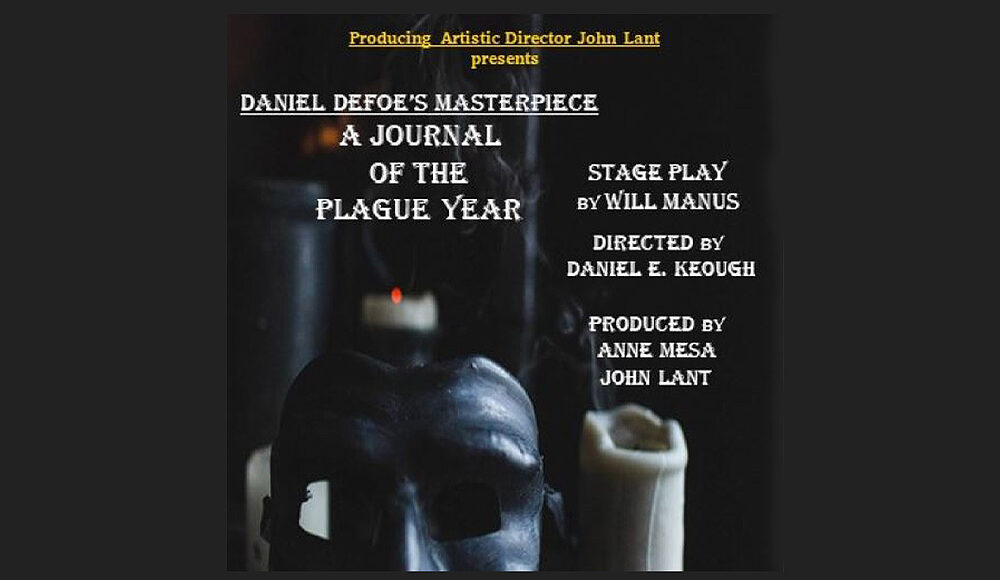By Ernest Kearney — There’s an old saw that annoys the hell out of me whenever I hear it: “History repeats itself.”
Wrong. History never repeats itself. It only seems that it does because humanity keeps making the same damn mistakes over and over again.
Playwright Willard Manus, whose succinct and compact adaptation of Daniel Defoe’s A Journal of the Plague Year, about the bubonic plague that swept London in 1665, currently at the Write Act Repertory, in North Hollywood, undoubtedly appreciates this fact.
Recently I compared notes from my Covid related readings over this past year with my friend Jim Earp who teaches at the University of Las Vegas. I reread The Great Influenza, John M. Barry’s definitive history of the 1918 Spanish flu outbreak, Jim reread Defoe’s 1722 novel. Each work is laden with apparent periodicities that are not examples of history’s repetitions but testaments to humankind’s entrenched stupidity which, sadly, is depressingly recognizable today.
At the outbreak of each disease, for political reasons, both Charles II and Woodrow Wilson downplayed the seriousness of their threats.
The governors of London suggested the city’s citizens simply avoid dung heaps and filthy horse stalls, explaining erroneously, their “miasma” or foul air, spread the “Great Mortality.” Nearly 300 years later, when some American scientists suggested the same source for “the grippe,” they were equally wrong.
As the deadly virus ravaged London, the King’s representatives to divert any accountability from their own inaction, placed all the blame on the “Dutch flu.” The Wilson administration, for similar reasons, decried the “Spanish flu” and when Americans accused the government of lying to them, their elected representatives responded, “Truth and falsehood are arbitrary terms….”
One may wonder if “We’ll Meet Again” was the funeral hymn for 670,000 Americans who died in the 1918 pandemic, and apparently Manus is wondering if we are soon to hear it sung once more.
Those who have read Robinson Crusoe (1719) will know the name of Daniel Defoe (1660-1731), those who haven’t probably don’t. This is to be regretted, because in a well-stocked bookstore one would find a volume penned by Defoe in every section other than that of computer sciences.
Journalist, spy, convict, political spin doctor, occasional rebel, satirical poet, pamphleteer-for-hire and hosiery salesman Defoe was a writing machine who employed around 195 pen names. Arguments can be made that Lord of the Flies, Catch-22, the Flashman series, modern travel writing, business journalism, social criticism and even women studies can be traced back to Defoe and there is no doubt that with such works as Moll Flanders (1722), he created the “Nonfiction Novel” long before Truman Capote’s In Cold Blood.
In his one hour abridgement, Manus succeeds in imparting the clash of science vs. rumors, facts vs. falsehoods, reason vs. insanity, selfishness vs. humanity, reality vs. delusion which fill Defoe’s book, while simultaneously layering his efforts with oblique whispers that speak volumes regarding our own times.
This is the first reason for one to see this production.
Unfortunately, it is also the last.
The cast, some of whom are actors of long experience, waver weirdly through their performances at once lethargic and disconnected, like slow motion footage of wind chimes in a hurricane.
The artistry of radio drama depends on union of the sound engineer’s acoustic talents and the actors’ vocal talents which were utterly absent here; most painfully in the lead actor.
Director Daniel Keough has approached his staging as the reading of a radio play, a concept typically utilized to obscure stress cracks suffered by a production encumbered by underfunding. But if one is willing to dig deeply, treasures may await, and often a dearth of means rewards the creative with inspiration’s mother lode.
Keough, however has neither explored nor exploited the possibilities of the conceit he has imposed on the narrative and therefore whatever theatrical gold there was to discover was simply left buried.
I will assume that after the long difficult period of isolation and disengagement which the Covid crisis has imposed on the Los Angeles theatrical community, the Write Act Repertory desperately needed just to climb back up into the saddle and go hell-bent for leather no matter what.
That is the only justification I have for this effort and I am willing to give it.
In his novel, Defoe praises those steadfast souls who struggled daily, no matter the cost, to liberate the living from the plague by the removal of its victim’s corpses.
That could be the case here. And so to paraphrase Defoe’s words: “It was never to be said of Los Angeles that the living were not able to bury the dead.”
_______________________________________________
A JOURNAL OF THE PLAGUE YEAR
runs
now thru December 19, 2021
Saturdays 8pm & Sundays 3pm
Where:
The Brickhouse Theatre
10950 Peach Grove St,
N. Hollywood, CA 91601
TICKETS ONLINE:
www.brownpapertickets.com/event/5303690
BY PHONE: 800-838-3006
$15 online / $20 at the door (cash only)





